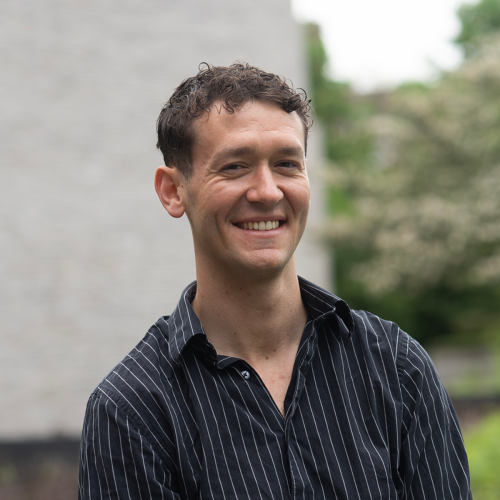
Photo by Bumper DeJesus
By Colton Poore, Andlinger Center for Energy and the Environment
June 12, 2025
Gabe Mantegna, graduate student in mechanical and aerospace engineering, has been selected as a Maeder Graduate Fellow by the Andlinger Center for Energy and the Environment for the 2025-2026 academic year to support his research on long-term energy planning for electric utilities.
In addition to Mantegna, the fellowship was awarded to Shukai Wang, a graduate student in the department of electrical and computer engineering.
The Maeder Graduate Fellowship is awarded to one or two graduate students each year who demonstrate strong potential to develop solutions for a sustainable energy and environmental future. The fellowship is supported by the Paul A. Maeder ’75 Fund for Innovation in Energy and the Environment and will cover the students’ tuition and stipend for the 2025–2026 academic year.
When it comes to energy system planning, utilities and operators navigate deep unknowns around the availability and cost of future energy technologies. There are also open questions around how factors such as climate change or the expansion of data centers could change the way the world consumes energy.
Mantegna is developing robust optimization models to help utilities and policymakers make energy planning decisions in the presence of so many uncertainties. Advised by Jesse Jenkins, an associate professor of mechanical and aerospace engineering and the Andlinger Center for Energy and the Environment, he is also employing those robust optimization approaches alongside tools like machine learning to rethink the way that utilities traditionally engage in reliability planning.
Mantegna, who spent several years at a biofuels startup and an energy consulting firm before beginning his Ph.D., said he appreciates the opportunities he has had in Jenkins’ ZERO Lab to partner with industry on real-world problems. As part of his project on deep uncertainty, for example, Mantegna is working directly with energy planners in California to develop his methods, present his findings, and ensure his work is practical for real-world applications.
“What is really unique about the ZERO Lab is how much we’re able to partner with industry to solve the problems that exist in the real world,” said Mantegna. “We’re able to combine different perspectives — policy, regulatory, and engineering — to do some incredibly innovative and important work.”
In addition to his research, Mantegna co-founded and is the CEO of Resilient Transition, a startup company that seeks to transfer the novel energy planning methods being developed in academia into usable solutions for utilities. He is also the president of the Macro-Energy Systems Society, which serves as a unifying force for energy systems researchers across universities to collaborate on energy challenges.
“There is a critical gap between the people in academia who are coming up with these novel methods for grid planning and the people actually on the utility planning side,” Mantegna said. “We’re really trying to develop a toolkit that can help transfer these innovations out of academia and into industry.”
While Mantegna enjoys being a part of the ZERO Lab and macro-energy systems communities, he also said that being a member of the Andlinger Center community has given him a unique opportunity to interact with researchers across a wide range of fields — often outside of his domain of expertise.
“One day I could be talking to someone working on building ventilation technologies, and the next day I could be talking to someone developing new battery chemistries,” Mantegna said. “It’s nice that the Andlinger Center can serve as a hub for all of these wildly different topics.”